How To Stop Farting Fast – 8 Effective Ways & Foods To Avoid
Learn the easiest ways to stop flatulence and save yourself from embarrassing situations.
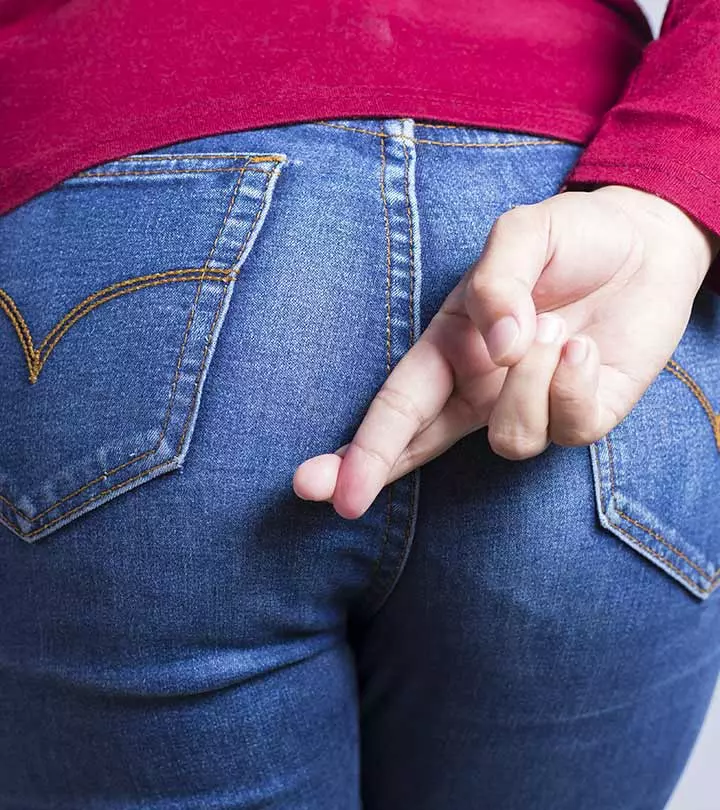
Image: Shutterstock
Flatulence, commonly known as farting, is not only embarrassing, especially in social situations, but also makes one feel bloated and heavy. If you are wondering how to stop farting, you are at the right place as there is some good news. Certain remedies can help minimize flatulence. Read on to learn more about them and understand which remedy works best for you.
In This Article
Why Am I Farting So Much?
Farting or passing gas is a completely normal part of your life and also a sign of a healthy digestive system.
Farting is essential for your body to function normally. If the gas is not passed, it can build up within your abdomen and cause discomfort.
Most healthy people pass gas 13-21 times per day (1). While this may sound like a lot, most farts are almost undetectable and odorless. Farting every day is considered normal, but farting all the time is not.
Most of the gas that you pass is due to swallowing air. We swallow air unknowingly while eating or drinking throughout the day. Other gases are produced by the intestines while digesting food. If you swallow a lot of air throughout the day, it will result in excessive farting.
If your fart smells, it is due to the breakdown of food into hydrogen sulfide. This may result in your fart smelling like rotten eggs. Increased intake of certain sulfur-rich foods like cabbage, alcohol, asparagus, coffee, chicken, dairy, and cucumber can also produce smelly farts.
The following are factors that could be contributing to increased production of gas in your intestines.
Key Takeaways
- Farting 13-21 times a day is normal, promoting proper body functioning. However, excessive farting is caused by swallowing air throughout the day.
- Other causes of farting include certain medications, allergies or intolerance, medical conditions, and food breakdown.
- Avoid certain food to stop farting, such as carbohydrate-rich food, fruits, and dairy products.
- Additional tips to stop farting include eating slowly, stopping smoking, and exercising daily.
What Is Causing You To Fart?
As mentioned earlier, swallowing air throughout the day is one of the main causes of excessive farting.
Other causes of gas production are:
- Breakdown of consumed food by the gut bacteria
- Certain medications like aspirin
- Food allergies or intolerance
- Medical conditions like irritable bowel syndrome, constipation, celiac disease, and indigestion
A study conducted on 1,584 participants with celiac disease found that 81% of respondents experienced some symptom or the other. It was noted that the most common symptoms were flatulence or farting (50.4%), bloating (70.4%), chronic fatigue (59.3%), anemia (49%), and diarrhea (60.6%).
Your diet may also have a role to play if you have been farting excessively.
What Foods To Avoid To Stop Farting?
Certain foods can cause you to produce more gas.
Carbohydrate-rich foods that contain lactose, fructose, starch, and insoluble fiber tend to ferment in the large intestine and release gas.
Foods that are known to cause excessive gas are (2):
- Beans and green leafy veggies like cabbage, Brussels sprouts, asparagus, and broccoli
- Onions and garlic
- Fruit juices and fruits like pears and artichokes
- Soft drinks and carbonated beverages
- Dairy products
- Potatoes, corn, wheat, and other starchy foods
Even though these foods can cause you to fart more, they should not be eliminated from your diet as they are very important for your health and well-being.
However, you may choose to limit their intake. You can also eat smaller and frequent meals instead of three large ones to prevent flatulence.
In addition to modifying your diet, here are some tips you can follow to stop farting.
8 Ways To Stop Farting Quickly
1. Eat Slowly

Swallowing air while eating, drinking, and talking can cause gas and farting. This is especially the case when a person eats too quickly. Instead, eat slowly and mindfully to reduce the amount of air you swallow (2).
2. Quit Smoking

Every time you take a puff from a cigarette, you also swallow a lot of air along with it. E-cigarettes are no exception. In general, those who smoke or use any tobacco products are more likely to experience flatulence and farting as compared to those who don’t (3).
3. Exercise Regularly

Inactivity can lead to the build-up of gas in your stomach. Doing mild to moderate exercises regularly can enhance gas clearance, reduce incidences of farting, and improve overall digestive health (4). Physical activity also helps relieve gas during pregnancy. However, always consult an OB-GYN before exercising.
 Quick Tip
Quick Tip4. Treat Constipation
Gas and bloating are symptoms associated with constipation (5). Hence, if your flatulence is a result of constipation, it is advised that you treat the condition to solve the problem.
 Quick Tip
Quick Tip5. Avoid Chewing Gum

The key ingredient in many sugar-free gums is hexitol. Ingestion of this ingredient, even in small amounts, has been associated with gas and bloating (6). Therefore, if you are among those who chew too much gum, you may want to cut down on them to stop flatulence.
6. Identify Food Intolerances And Allergies
Certain food allergies and intolerances may also be responsible for excessive gas. However, this may vary from one person to another. Make a note of foods that you are allergic or intolerant to.
You can also determine which food is causing gas in your system. For this, you need to first eliminate all gas-producing foods from your diet. Introduce these foods back in, one at a time, to identify the culprit. You can either avoid or limit your intake of the food that has been causing flatulence.
7. Take Probiotics And Enzyme Supplements

While probiotics can modify the composition of the gut flora and reduce intestinal gas, digestive enzyme supplements can help in relieving gastrointestinal symptoms by enhancing digestion (7), (8). Hence, you can try any of these to manage flatulence.
8. Drink Peppermint Tea
The peppermint oil extract the tea is made of may effectively reduce abdominal pain, flatulence, and diarrhea in people with irritable bowel syndrome (9). Drinking peppermint tea daily may possibly help relieve indigestion and prevent farting. You can consume 2 to 3 cups of peppermint tea per day.
How To Prepare Peppermint Tea:
What You Need
- ½ cup of dry peppermint leaf
- 4 cups of hot water
- 2 tablespoons of honey
How To Prepare
- Boil water in a medium-sized pan.
- Add the peppermint leaves to the pan and let it boil for about 10 minutes.
- Turn off the heat and keep it aside.
- Let it cool for 5 minutes.
- Strain the tea into cups.
- Add honey to the tea.
- Serve hot and enjoy!
You can try peppermint oil instead to relieve gas, bloating, and farting. Apart from these, several other home remedies for gas may also offer relief.
Karen Christian, a lifestyle blogger, recounted her experience of going on a silent retreat which helped her stop farting. She experienced a massive drop in stress and anxiety levels that also helped stem her flatulence issues. She recounts, “Several of my medical issues have stress and anxiety at their root. The difference removing that stress made was incredible (i).”
While these home remedies can often provide relief from occasional flatulence, it is important to recognize when to seek medical attention.
When To Seek Medical Advice
If you experience any of the following conditions along with persistent or severe flatulence, you may need to visit your healthcare provider:
- Abdominal pain
- Diarrhea
- Weight loss
These symptoms may indicate an underlying medical condition that requires medical attention. This responsible approach to your health ensures that you’re proactive in managing any potential issues.
Infographic: Natural Remedies To Relieve Flatulence
While avoiding certain food groups, changing your lifestyle, and dietary habits can help decrease the gas build up eventually, sometimes, you have to deal with a sudden gas buildup and find yourself stuck in an embarrassing situation. That’s when the natural remedies listed here can help save the day. Check out the infographic below for all details.
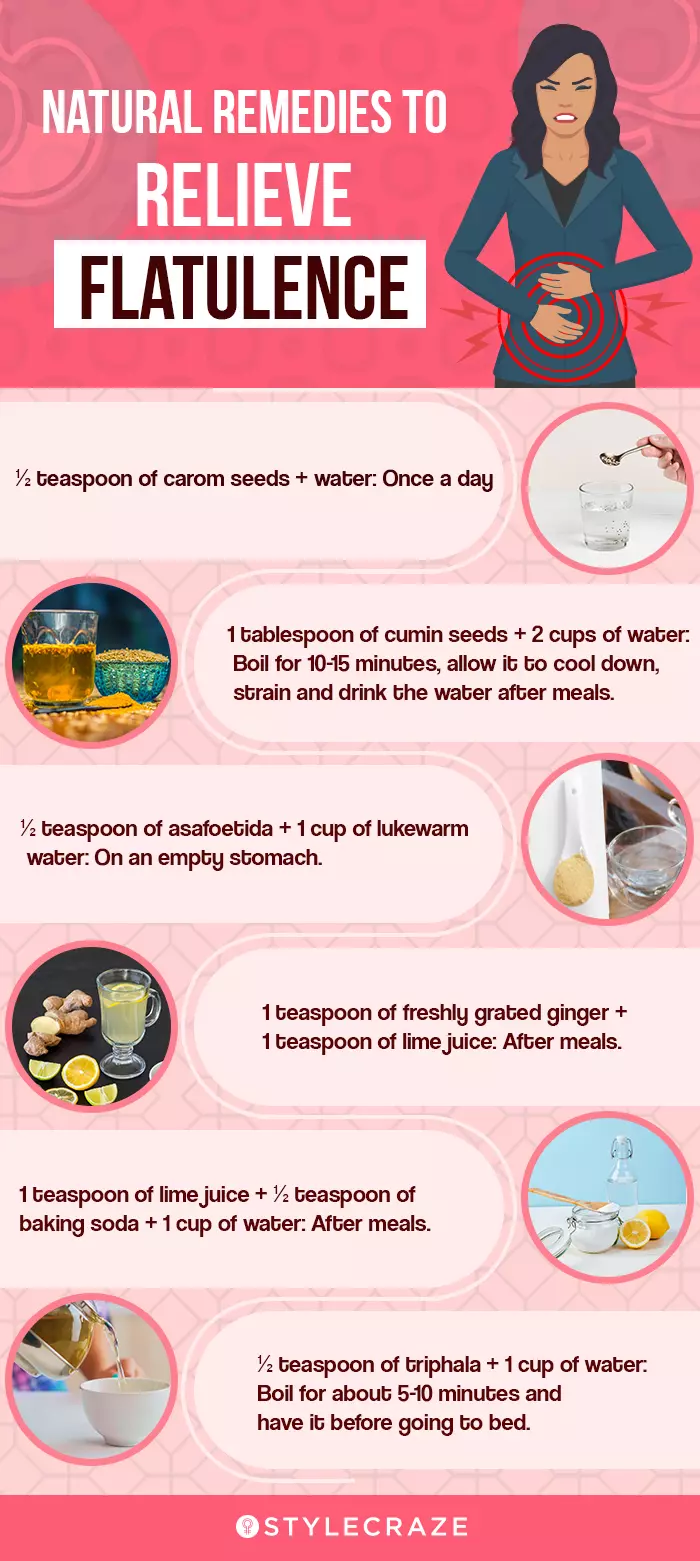
Illustration: StyleCraze Design Team
Farting or flatulence is a sign of a healthy digestive system. But it may cause extreme embarrassment. Swallowing air, food allergies, medications like aspirin, and conditions like irritable bowel syndrome, indigestion, and constipation are the main causes of gas. But there are some effective ways to stop farting. Eating the food slowly, quitting smoking, exercising regularly, treating constipation, and avoiding chewing gum may help prevent farting. However, consult your doctor if these remedies and tips do not work.
Hope you found this post helpful. What do you do to deal with flatulence? Let us know in the comments section below.
Frequently Asked Questions
Can you fart in your sleep?
Yes, it is normal to pass gas in your sleep.
Do you fart more with age?
Yes, there may be an increase in flatulence and farting with age. A slower metabolism, reduced strength of stomach muscles leading to the slower passage of food matter through the intestines, and a lack of digestive enzymes may lead to more flatulence in older people.
Does ginger help with farting?
Yes, home remedies like ginger may help reduce farting as it can help relieve bloating and constipation (10). However, excess consumption of ginger may have the opposite effect and increase digestive issues.
Do bananas make you fart?
Bananas are a source of soluble fibers and hence may cause gas and bloating in individuals with existing digestive issues.
Stop flatulence with one simple trick that really works! Learn how to stop farting and avoid embarrassment in public. Check the following video to learn more!
Personal Experience: Source
StyleCraze's articles are interwoven with authentic personal narratives that provide depth and resonance to our content. Below are the sources of the personal accounts referenced in this article.
i. How Going on a Silent Retreat Stopped Me Fartinghttps://medium.com/quest-for-quiet/how-going-on-a-silent-retreat-stopped-me-farting-592c944b13c8
References
Articles on StyleCraze are backed by verified information from peer-reviewed and academic research papers, reputed organizations, research institutions, and medical associations to ensure accuracy and relevance. Read our editorial policy to learn more.
- “Gas” MedlinePlus, US National Library of Medicine.
- “Prevention and Treatment of Flatulence From a Traditional Persian Medicine Perspective” Iranian Red Crescent Medical Journal, US National Library Of Medicine.
- “Gas and Bloating” Gastroenterology And Hepatology, US National Library Of Medicine.
- “Physical activity and intestinal gas clearance in patients with bloating” American Journal of Gastroenterology, US National Library Of Medicine.
- “Management Strategies for Abdominal Bloating and Distension” Gastroenterology And Hepatology, US National Library Of Medicine.
- “Hypothesis: hexitols in chewing gum may play a role in reducing postoperative ileus.” Medical Hypotheses, US National Library Of Medicine.
- “Probiotics and functional abdominal bloating.” Journal of Clinical Gastroenterology, US National Library Of Medicine.
- “Herbal remedies for dyspepsia: peppermint seems effective” Prescrire International, US National Library Of Medicine.
- “Can the supplementation of a digestive enzyme complex offer a solution for common digestive problems?” Archives Of Public Health, US National Library Of Medicine.
- “Ginger in gastrointestinal disorders: A systematic review of clinical trials” Food Science & Nutrition, US National Library Of Medicine.
Read full bio of Lucas Aoun
Read full bio of Shaheen Naser
Read full bio of Arshiya Syeda
Read full bio of Dipti Sharma







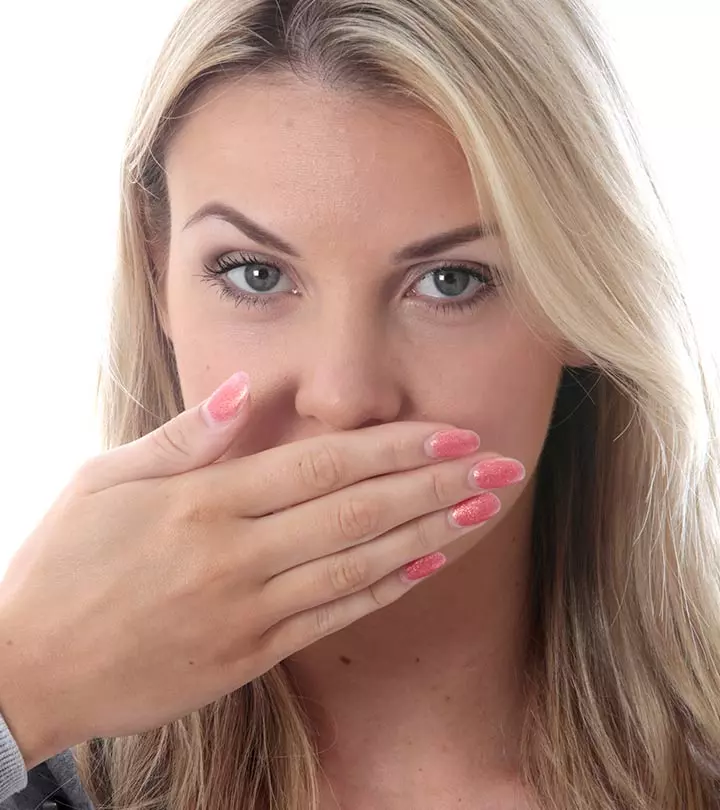


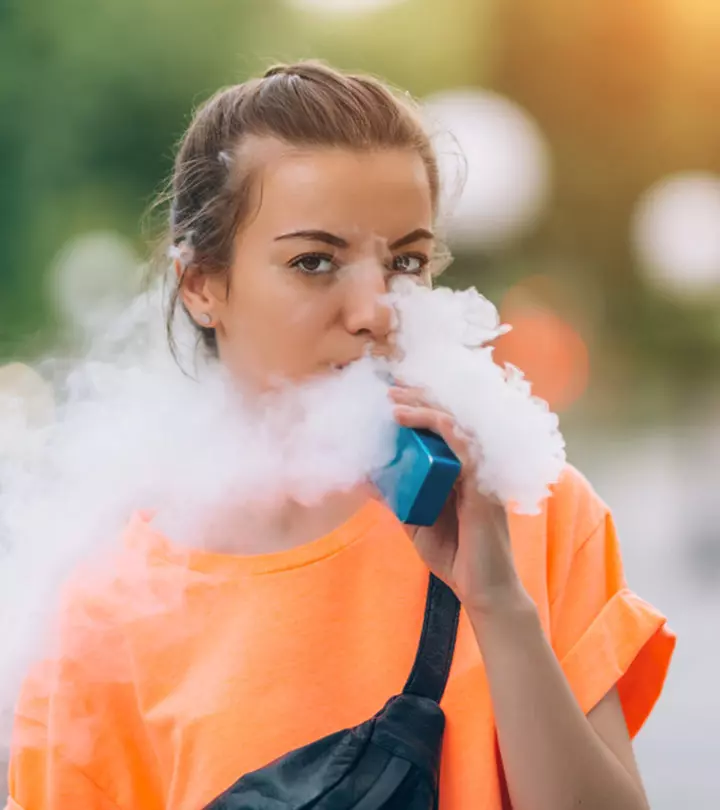

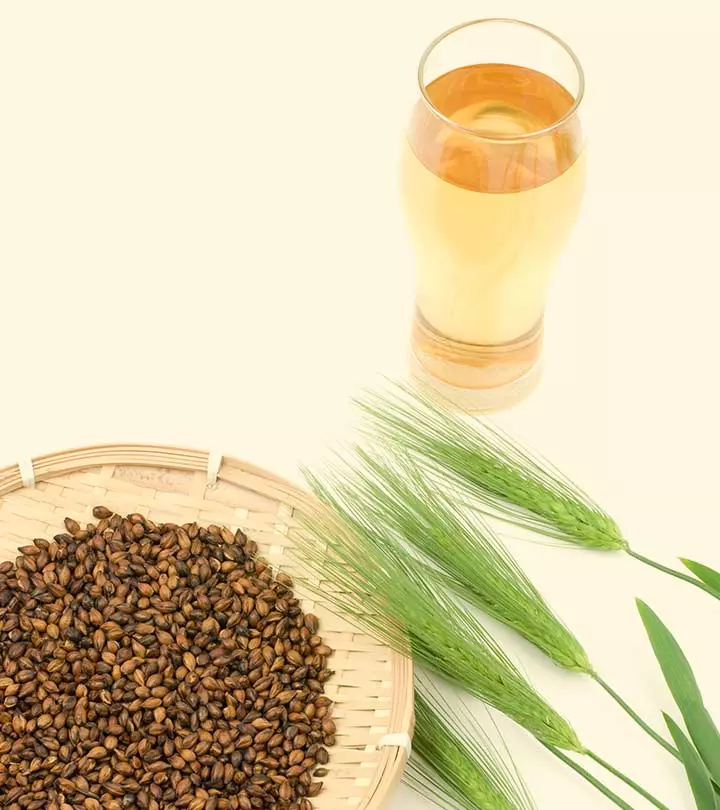

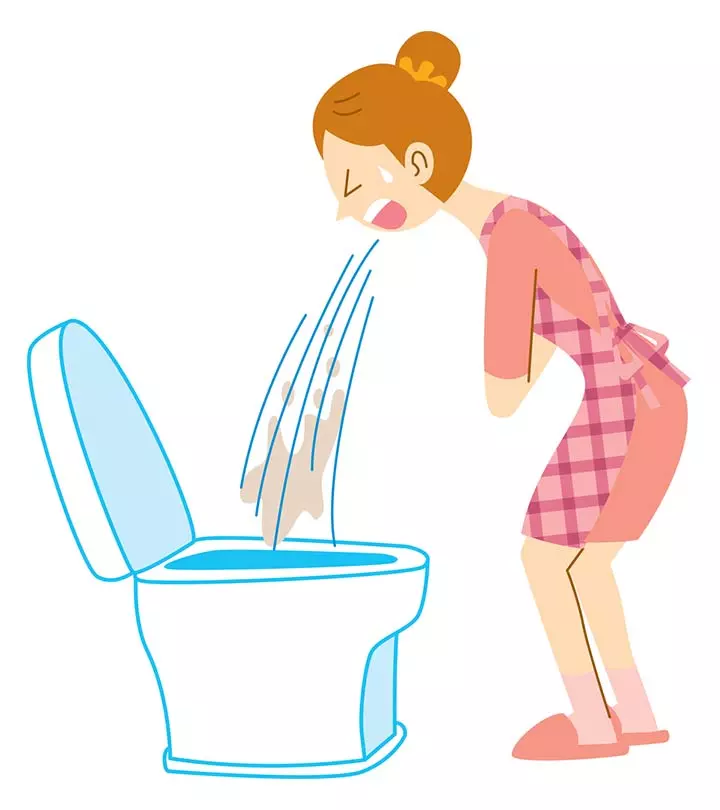












Community Experiences
Join the conversation and become a part of our empowering community! Share your stories, experiences, and insights to connect with other beauty, lifestyle, and health enthusiasts.